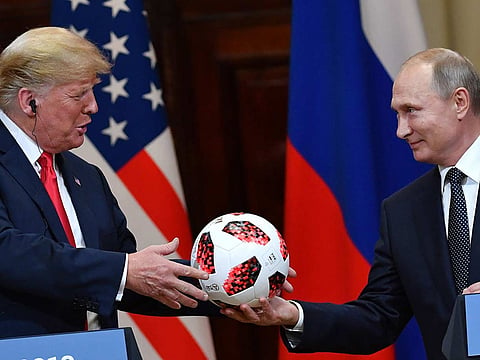Trump: US to exit nuclear treaty, citing Russian violations
Washington believes Moscow is developing a ground-launched system in breach of the INF treaty

President Donald Trump said on Saturday the United States will exit the Cold-War era Intermediate-Range Nuclear Forces Treaty that eliminated a class of nuclear weapons, in a move that is likely to upset Russia.
The INF treaty, negotiated by then-President Ronald Reagan and Soviet leader Mikhail Gorbachev and ratified by the U.S. Senate in 1988, required elimination of short-range and intermediate-range nuclear and conventional missiles by both countries.
"Russia has not, unfortunately, honored the agreement so we're going to terminate the agreement and we're going to pull out," Trump told reporters after a rally in Nevada.
Washington believes Moscow is developing and has deployed a ground-launched system in breach of the INF treaty that could allow Moscow to launch a nuclear strike on Europe at short notice. Russia has consistently denied any such violation.
Trump said the United States will develop the weapons unless Russia and China agree to a halt on development.
China is not a party to the treaty and has invested heavily in conventional missiles as part of an anti-access/area denial strategy, while the INF has banned U.S possession of ground- launched ballistic missiles or cruise missiles of ranges between 500 and 5,500 km (311 and 3,418 miles).
Trump's national security adviser, John Bolton, will visit Moscow next week.
Bolton readies Moscow visit
President Donald Trump’s national security adviser, John Bolton, will visit Moscow next week for talks that may include telling Russian officials that the United States plans to withdraw from the landmark Intermediate-Range Nuclear Forces Treaty.
While Bolton will discuss other major topics with Russian officials, including North Korea, Ukraine and Syria, the 1987 accord between the United States and the former Soviet Union is also expected to come up.
A senior Trump administration official said two administrations had tried to bring Russia back into compliance with the treaty.
“Despite our objections, Russia continues to produce and field prohibited cruise missiles and has ignored calls for transparency,” the official said.
Withdrawing from the INF treaty could have major implications for U.S. defense policy in Asia and toward its main strategic rival there, China, with which Trump is engaged in a trade war.
The Kremlin said Russian President Vladimir Putin planned to meet with Bolton, the RIA news agency reported. Bolton’s meetings in Moscow were scheduled for Oct. 22-23, RIA said.
Bolton said on Twitter that he planned to meet with top Russian officials but did not mention Putin.
“Heading to Moscow tomorrow to meet with senior Russian leaders, including Foreign Minister Sergei Lavrov and Security Council Secretary Nikolai Patrushev, to continue discussions that began in Helsinki between our two countries,” Bolton said.
A senior administration official said Bolton will use the trip to discuss the next meeting between Trump and Putin. The two leaders may see each other in Paris at a Nov. 11 celebration of the 100th anniversary of the end of World War One.



